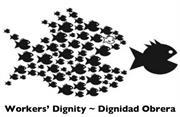Workers' Dignity Project / Dignidad Obrera
Programs
Budget
$33,500.00
Description
In 2017, Workers' Dignity is holding three English as a Second Language courses. English courses are based on a 12-week, 48-hour curriculum that utilizes TABE-based diagnostic, formative, and summative assessments. We teach language that is most practical for job searching, interviews, workplace conversation, and communication with school staff for parents of school-age children.
Program Areas Served
None
$33,500.00
Description
In 2017, Workers' Dignity is holding three English as a Second Language courses. English courses are based on a 12-week, 48-hour curriculum that utilizes TABE-based diagnostic, formative, and summative assessments. We teach language that is most practical for job searching, interviews, workplace conversation, and communication with school staff for parents of school-age children.
Program Areas Served
None
Budget
$38,000.00
Description
Our 6-week summer Justice School will educate at least 30 low-wage workers, taught through popular education workshops addressing the history of social movements, women's equality, the Civil Rights Movement and effective organizing strategies. We will hold three worker education and organizing institutes in 2017, in May, August, and November. These 2-day trainings will provide needed skills for effectively improving conditions in the workplace.
Program Areas Served
None
$38,000.00
Description
Our 6-week summer Justice School will educate at least 30 low-wage workers, taught through popular education workshops addressing the history of social movements, women's equality, the Civil Rights Movement and effective organizing strategies. We will hold three worker education and organizing institutes in 2017, in May, August, and November. These 2-day trainings will provide needed skills for effectively improving conditions in the workplace.
Program Areas Served
None
Budget
$42,000.00
Description
Provide Train the Trainer program to 100 construction workers in 2021 so that at least 50 of these 100 workers will lead labor rights workshops and wage theft recovery for about 1,500 workers thereafter. There will be a six week training (2.5 hours per class) for 10 workers/participants each time that will provide them with the knowledge and tools necessary to co-facilitate monthly labor rights and wage recovery clinics to their peers. Training entails an explanation of federal and state labor laws, effective strategies for wage recovery, health and safety precautions and things to watch out for, and opportunities to practice supporting workers with expert observation and guidance.
Category
Civil Rights, Social Action, Advocacy - Ethnic Groups' Rights & Racial Equality
Beneficiaries
Hispanic/Latino/Latina/Latinx
Economically disadvantaged people
At-Risk Populations
Program Areas Served
None
$42,000.00
Description
Provide Train the Trainer program to 100 construction workers in 2021 so that at least 50 of these 100 workers will lead labor rights workshops and wage theft recovery for about 1,500 workers thereafter. There will be a six week training (2.5 hours per class) for 10 workers/participants each time that will provide them with the knowledge and tools necessary to co-facilitate monthly labor rights and wage recovery clinics to their peers. Training entails an explanation of federal and state labor laws, effective strategies for wage recovery, health and safety precautions and things to watch out for, and opportunities to practice supporting workers with expert observation and guidance.
Category
Civil Rights, Social Action, Advocacy - Ethnic Groups' Rights & Racial Equality
Beneficiaries
Hispanic/Latino/Latina/Latinx
Economically disadvantaged people
At-Risk Populations
Program Areas Served
None
CEO/Executive Director/Board Comments
| According to the Migration Policy Institute, between 2000 and 2010, the overall immigrant population in Tennessee grew faster than in any other state in the nation. The 2010 Census reports that during this same period, Nashville's Latino population increased by approximately 134 percent, with about 63,000 Latinos in Davidson County (Nashville) and over 110,000 in the Middle Tennessee area, where our work in centered. Caught between a deeply flawed federal immigration system and a generally hostile state and local policymaking environment, low-wage immigrant families are among the most economically vulnerable Tennesseans. They do some of the most undervalued and lowest paid jobs across industries, some of which are construction, cleaning, landscaping, and food service. According to a 2008 study by the National Employment Law Project (NELP), wage theft is a national epidemic. The NELP reports: 26% of low-wage workers, on average, were paid less than the required minimum wage in any given week; 76% of those who worked more than 40 hours per week were not paid the legally required overtime pay; and 12% of tipped workers experienced theft of tips by their employer or supervisor. Our members in Middle Tennessee report many of the same problems. Commercial and retail cleaning employees are misclassified as sub-contractors, permitting the employer to deny overtime, workers compensation, and other legal entitlements. Restaurant workers are often paid below the minimum wage. Half of wage theft complaints have come from groups of workers in the same workplace, suggesting that unscrupulous employers systematically steal from their employees. In one third of wage theft complaints addressed by Workers' Dignity, employers threatened to call Immigration and Customs Enforcement or police. In dozens of cases, employees were threatened with physical violence. Since January 2014, after intensive outreach to African American and white workers, several have reported threats of retaliation by employers. Those with a felony record fear losing job as a violation of probation or parole. We empower low-wage workers to overcome threats and intimidation, see themselves as leaders, and take action to improve their situations. According to our exploratory research survey of cleaning workers, housekeepers confront dangerous working conditions, lack health and safety training, and often are denied emergency medical care. Worker-led monitoring of wages, health, and safety provides the only remedy to the rampant abuses low-wage workers face in Nashville's hospitality industry. |

